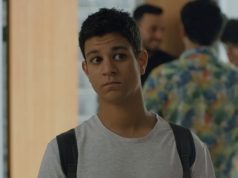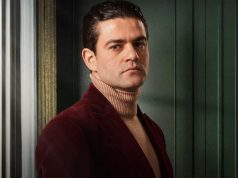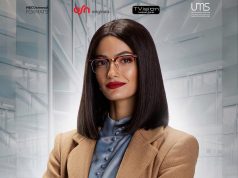By Zainab AbdulAziz
To say that this summer’s El Mamar will be epic is quickly becoming an understatement. A mammoth of a movie, the film directed and penned by Sherif Arafa is the talk of the town and poised for a June release date just in time for summer holidays. Every detail has been considered from the cast undergoing tactical training, the special access to restricted locations, and the reenacted war scenes guaranteed to blow audiences away. In our first of two behind-the-scenes interviews, we spoke with the exuberant Mohamed Farrag to learn more about his experience working with Arafa, one of his cinematic heroes, and how important this movie is to Egypt’s film industry.
CWM: El Mamar is set to be this summer’s big blockbuster, and everyone is eager to know what their favorite stars will be doing in this film. How did it feel to get that call?
The moment I got the call to come in for a meeting with Sherif Arafa, I was changed as a person. I was trembling with excitement, and wondering and hoping that the project would be immense and challenging. I certainly got what I hoped for! After the meeting, I left the building practically cross-eyed with disbelief that my name would be up there on the poster.
For any actor to partake in a movie that deals with such an important chapter in Egypt’s history is a deep honor. I think it’s a shame that we don’t have more films that celebrate and honor our armed force’s complex and storied history, which is full of successes and interesting characters. I consider myself lucky and thank Mr. Arafa for choosing me to portray this man, and Hisham Abdel Khaleq for producing this epic film.
Can you tell us a bit about your character?
I play the role of an Upper Egyptian soldier named Hilal in the film during the Six-Day War of 1967 and the film follows his trajectory from 1967 up until the events of the October 1973. He’s a sniper in the army, a deeply patriotic man and as most Upper Egyptians are, he is a hot-blooded guy with a sense of vengeance towards what happened to Egypt in 1967. He is selected to join a special unit of army operatives to carry out an important mission, and he carries a personal sense of responsibility for regaining what his country lost. He doesn’t even want to return home to his village until the land is brought back to Egypt.
How did you prepare for such an important and highly skilled role?
The Egyptian armed forces supported us a lot in the production of the film, both in terms of the functional training to be able to portray the characters in such a real way and also in terms of lending us the necessary set locations to make the film look believable and natural. Hilal is from Sohag, so I had to also work very hard on my dialect and presentation of the character, as Upper Egypt is a wide and nuanced region with several dialects and mannerisms. Audiences will see a vast variety of characters in this film that represent Egypt as a whole, from Sohag to Nubia, Alexandria, and Sinai.
There were loads of table reads and preparations for this film, with experts that witnessed this time period personally. We heard so many stories and personal accounts, which made us feel like we were there ourselves during this era. Last but not least, the whole cast attended heavy and professional training with the army to prepare ourselves for a simulated war. We trained from 6 AM to 4 PM every day for several weeks to learn how to shoot, fight and operate as a true army unit. We learned how to engage a foe even without weapons, how to aim, and how to prep and handle your weapon in real-time. There is an immense amount of work and practice that goes into just behaving as an army unit, down to the way you move or march or communicate with each other. Although it was hard work, we all collectively had the drive and passion to do the work with enthusiasm due to how much we believed in the film as a cast and crew.
You mentioned the filming locations, and audiences will certainly be looking forward to seeing these places, could you tell us more about what to expect?
Definitely, it will be the first time for audiences to see these places on the big screen thanks to the army who allowed us to film there. We filmed in all the places where the war actually took place – Suez, Ismailia, Anshas, military airports, the deserts outside Hurghada, and many places that directly correlated to the army’s tactical activities during that time. We had the full support of the military during the production in terms of the décor and necessary equipment in order to make the film look as believable as possible.
What were some of the most challenging scenes to shoot during filming?
The biggest challenge for me was to pull off this character in a real way and to fight against playing a cliché character. Making a director like Mr. Arafa proud is in itself a challenge! Upper Egyptian characters on the screen are usually portrayed in a cliché manner, even though it is a region in Egypt that is very large and varied. I wanted Hilal to be a fully formed and distinguished person, down to his mustache and eye movements.
As for the scenes, I am not afraid of adversity. It pleases me. However, this is a war movie, so of course there were challenging scenes in terms of the physicality of it. We had injuries on set – both the actors themselves and their stunt doubles! Ahmed Ezz’s stunt double had quite a bad injury during a fight scene with Eyad Nassar’s stunt double.
Would you consider this role a career highlight?
Definitely. This is my first time working with Mr. Arafa, and I have followed his career since I was a kid and look up to him so much. I memorized his films shot by shot! I’ve always wanted to work with him, and I feel my chance has come at the right time. Perhaps if it had come sooner or later, I wouldn’t have been so confident in my abilities. I am so proud to be a part of this project.
What can you fans expect from you in Ramadan this year?
I’m finishing up a TV series named Qabeel with Mohamed “Tyson” Mamdouh and Amina Khalil, directed by Karim El Shenawy. It’s a suspense thriller that deals with a murder and the subsequent police investigation into the crime. I found the plot exciting and different, and the role I play is like nothing I’ve done before – especially coming off the back of my role in Howa Da Elly Sar. Audiences might find the tone of the series a bit Westernized, but I found the script very catchy and I believe the final result will be very cool and true to our Egyptian style.
QUICKFIRE ROUND
Must-have Ramadan Food?
I adore molokheya, all year – not just in Ramadan!
Favorite place to relax?
Good question, my girlfriend’s house! Wherever she is, I am relaxed.
Best place to escape?
The Far East!
Can’t leave home without …
Turning off all the lights and switching off the water. I’m environmentally conscious!
What do you wish more people would do?
Appreciate and respect the actor’s craft. And I hope they love what I produce. I really adore my job, and I’m trying to make the whole industry more effective – not just my personal work. I’m passionate about what I do, and I love my fans and the audience. I focus on every single detail.
Last great book you read?
It’s a book about how to improve your body language as an actor. It’s called El Momasel Wel Herban by Dr. Samy Salah.

Photo Credit for Mohamed Farrag Portrait:
Ahmed Hayman
Email: [email protected]
Website: www.ahmedhayman.com
Instagram: @haymanics







